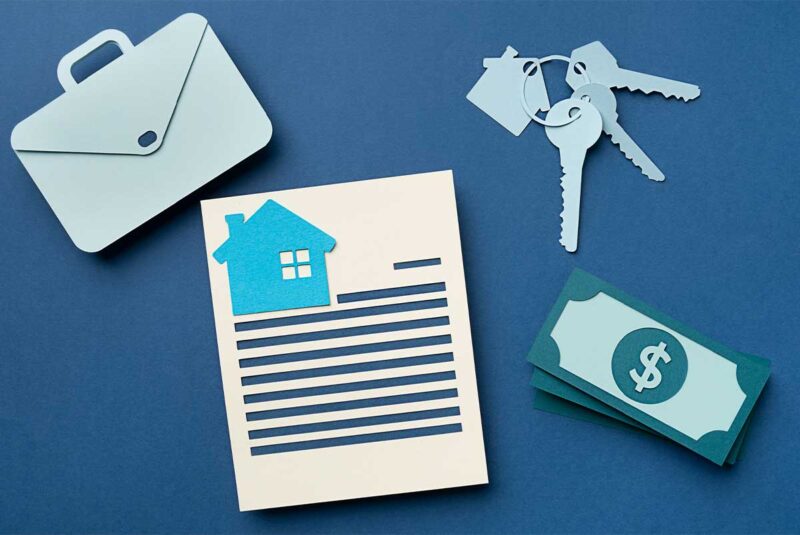Ready To Buy a Home?
Get Approved to Buy a Home
Rocket Mortgage® lets you get to house hunting sooner.
When applying for a mortgage, lenders pay close attention to your credit history, assets and debt-to-income (DTI) ratio to help them decide if you qualify for the loan. If you carry a lot of debt, your credit history is poor or your credit score is low, lenders may charge you a higher interest rate or deny your mortgage application.
However, there may be some instances when applying with someone else, like a co-borrower, might help you qualify for a loan or secure more favorable loan terms.
So, what is a co-signer and what is a co-borrower? Is there a difference? Understand how they impact your home loan in our guide to co-borrowers.
What Is a Co-Borrower?
Quick refresher: A borrower assumes sole ownership and responsibility for repaying a loan. A co-borrower might or might not share ownership and is equally responsible for loan repayment.
In real estate, a co-borrower is someone who applies for a mortgage with you and shares in the loan repayment obligations. Depending on your agreement, this person(s) may or may not share ownership. They can, but they don’t need to live with you.
Why you might get a co-borrower:
- To get a lower interest rate or a larger loan
- To help you repay a loan if you’re unable to on your own
- To help you buy a home with two or more people
When you might get a co-borrower:
- You’ve applied for mortgages and you’re not getting the interest rate you want.
- You’re hesitating to submit a loan application because you don’t have a favorable DTI or want to qualify for a better rate with a higher credit score.
If you plan on being the only borrower living on the property, you’ll need a non-occupant co-applicant.
How Does Getting a Co-Borrower Loan Work?
Once you’ve decided to add a co-borrower, applying, underwriting (a lender double-checks to verify that you qualify for a loan) and qualifying for a mortgage is fairly similar to the experience of applying on your own. Let’s look at the responsibilities and considerations of each party:
Lenders:
- Look at a borrower’s credit history, income, employment history and debt to determine whether they qualify for a loan
- Use the lowest median credit score of all co-borrowers to see if you qualify (Fannie Mae uses the average median credit score when multiple borrowers are present.)
Co-Borrowers:
- Should have a qualifying credit score of 580 or higher
- Should have a lower DTI, preferably lower than 45%, but it depends on the loan you’re applying for. Your DTI is combined for qualification purposes, so ideally you want to add someone who has very low debt in comparison to whatever income they’re adding to the qualification.
- Should avoid taking on other large debts during the loan application process
- Should decide who will live on the property and whose names will be on the title
- Should know each other’s financial activities because it will impact everyone’s chance at getting approved for a loan during the underwriting process
What Makes a Good Co-Borrower?
Now that you know what lenders look at in terms of each co-borrower, there are a few key characteristics of an ideal co-borrower:
- Solid income: Having more income (or assets) to repay a loan looks more favorable to lenders.
- Good credit history: If their credit score is better than yours, this can boost your chances of getting a better interest rate.
- Lower debt-to-income (DTI) ratio: By combining your income, you may have a lower DTI than if you applied on your own. It’s also a good thing if your co-borrower has a lower range DTI.
Most co-borrower situations involve spouses or family members, but a co-borrower can be anyone whose income, assets and credit history are used to qualify for a loan.
The one thing to be aware of is that if you have a non-occupant co-applicant and they aren’t a family member, you may be required to have a higher down payment in a purchase or have more equity in a refinance.
What Are the Pros and Cons of Having a Co-Borrower?
Sometimes a co-borrower is the only option – and a good one – for borrowers with low credit scores, low incomes or high debt. However, there are other options to consider.
Here’s a list of benefits and risks that come with having a co-borrower on a mortgage:
Pros
- It may help you secure a lower mortgage interest rate and/or a larger mortgage.
- Your co-borrower is also responsible for the monthly mortgage payments. So you don’t pay the mortgage on your own. (Spoiler alert: You’ll also see this in the cons section!)
- All borrowers are building good credit – even the ones who don’t live in the home.
- You may save money if you split expenses with your co-borrower(s).
Cons
- Your credit score may be affected by the financial habits of your co-borrower(s).
- Since you and your co-borrower(s) are responsible for the mortgage payment, if one of you can’t make a monthly payment, the other is financially responsible.
- You and your co-borrower(s) may share ownership of the property, which means you might not be the sole decision maker on anything related to the property. Sorry! 🤷
- If you co-own and live together on the property and one co-borrower dies, depending on the type of title you have and your relationship to your co-borrower, the surviving co-borrower(s) may or may not be able to stay in the home. Speak with a real estate attorney to figure out the best setup for you.
What’s the Difference Between a Co-Borrower and a Co-Signer?
Although this may not be true for every type of loan, when it comes to mortgage qualification, there’s no difference between a co-signer and a co-borrower. Whatever you call it, you and your co-borrower can decide whether the co-borrower has any ownership rights to your property.
In general, it’s usually a good idea for a co-borrower to also be on the title to the property. Otherwise, they’re taking equal risk to the person who actually owns the home while gaining none of the benefits. However, you don’t have to share ownership.
Are There Alternative Options To Getting a Co-Borrower?
If you think it may not be a good idea to get a co-borrower and a conventional loan isn’t in the cards for you, there are some alternative options to help secure a good mortgage.
- Federal Housing Administration (FHA) loan: FHA loans have lower credit score requirements with a 10% down payment (500 or higher). If you qualify with a score of 580 or higher, you can make a 3.5% down payment. Many lenders require a 580 qualifying score anyway. Lenders prefer a DTI of 43% (although a higher DTI may be permitted). You’ll have to pay a mortgage insurance premium (MIP) with an FHA loan.[1]
- Fannie Mae HomeReady® or Freddie Mac Home Possible® loan: These conventional loans can allow for a DTI as high as 50%. You can put 3% toward a down payment, and you’ll need a minimum credit score of 620, depending on the interest rate terms.[2] [3]
- Department of Veterans Affairs (VA) loan: To qualify for a VA loan you must be a qualifying veteran, active-duty service member, eligible reservist or National Guard personnel or qualifying surviving spouse. Although there’s no minimum credit score requirement and no maximum DTI, lenders may set their own requirements and typically prefer a minimum credit score of 580 and maximum DTI of 60%. You may not need money for a down payment, and you won’t need to pay mortgage insurance, but you may need to pay an upfront funding fee that’s 1.4% – 3.6% of your total loan amount.[4] [5]
Teamwork Makes the Dream Work
If you decide to get a co-borrower, it can help you get a good mortgage or better mortgage terms.
Help ensure a smoother mortgage application process by being extra careful with your spending as lenders begin the underwriting process. Make sure your credit and your co-borrower’s credit are in good standing, you don’t take on new debt and your income(s) remains stable.
If all goes well, you and your co-borrower could be dancing around your new home belting out “This Is What Dreams Are Made Of” in early 2000s style. 🎤 🎉
Get approved to buy a home.
Rocket Mortgage® lets you get to house hunting sooner.
The Short Version
- A borrower assumes sole ownership and responsibility for repaying a loan. A co-borrower may or may not share ownership but is equally responsible for loan repayment
- Most co-borrower situations involve spouses or family members, but a co-borrower can be anyone whose income, assets and credit history are used to qualify for a loan
- Sometimes a co-borrower is the only option – and a good one – for borrowers with low credit scores
Federal Deposit Insurance Corporation. “203(b) Mortgage Insurance Program.” January 2022 from https://www.fdic.gov/consumers/community/mortgagelending/guide/part-1-docs/203b-mortgage-insurance-program.pdf
Fannie Mae. “Eligibility Matrix.” Retrieved January 2022 from https://singlefamily.fanniemae.com/media/20786/display
Freddie Mac. “Home Possible®.” Retrieved January 2022 from https://sf.freddiemac.com/working-with-us/origination-underwriting/mortgage-products/home-possible
U.S. Department of Veterans Affairs. “VA Guaranteed Loan.” Retrieved January 2022 from https://www.benefits.va.gov/BENEFITS/factsheets/homeloans/VA_Guaranteed_Home_Loans.pdf
U.S. Department of Veterans Affairs. “VA funding fee and loan closing costs.” Retrieved January 2022 from https://www.va.gov/housing-assistance/home-loans/funding-fee-and-closing-costs/




